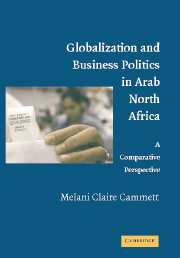Book contents
- Frontmatter
- Contents
- List of Tables and Figures
- Acknowledgments
- List of Abbreviations
- Map of Morocco
- Map of Tunisia
- I THE FRAMEWORK
- II THE INSTITUTIONAL CONTEXT
- III GLOBALIZATION AND INSTITUTIONAL CHANGE
- 5 Business as Usual: State-Sponsored Industrialization and Business Collective Inaction in Tunisia
- 6 Fat Cats and Self-Made Men: Class Conflict and Business Collective Action in Morocco
- 7 Globalization, Business Politics, and Industrial Policy in Developing Countries
- Appendix A Methodological Note and List of Interviewees
- Appendix B Standardized Questionnaire for Textile and Apparel Industrialists and Factory Managers
- Bibliography
- Index
6 - Fat Cats and Self-Made Men: Class Conflict and Business Collective Action in Morocco
Published online by Cambridge University Press: 23 December 2009
- Frontmatter
- Contents
- List of Tables and Figures
- Acknowledgments
- List of Abbreviations
- Map of Morocco
- Map of Tunisia
- I THE FRAMEWORK
- II THE INSTITUTIONAL CONTEXT
- III GLOBALIZATION AND INSTITUTIONAL CHANGE
- 5 Business as Usual: State-Sponsored Industrialization and Business Collective Inaction in Tunisia
- 6 Fat Cats and Self-Made Men: Class Conflict and Business Collective Action in Morocco
- 7 Globalization, Business Politics, and Industrial Policy in Developing Countries
- Appendix A Methodological Note and List of Interviewees
- Appendix B Standardized Questionnaire for Textile and Apparel Industrialists and Factory Managers
- Bibliography
- Index
Summary
Le patronat est devenu plus revendicateur que les syndicats!
(Business has become more demanding than the labor unions!)
Abdelmajid Bouzoubaa, official, Confédération Démocratique du Travail, February 10, 2000Signe des temps, ce sont les patrons qui revendiquent et non les employés.
(As a sign of the times, it is business that makes demands and not workers.)
Maroc-Hebdo, May 12–18, 2000, 18The political economy of Morocco is often depicted as unshaken in the face of challenges from abroad and at home. The literature focuses overwhelmingly on the primary place of the monarchy and palace politics in determining economic and social outcomes. A tenet of the literature on postindependence Moroccan politics is that the private sector most effectively lobbies decision makers and influences policy through opaque personal channels, and that patronage is essential for any transaction. (Hammoudi 1997; Hibou 1996; Layachi 1999; Leveau 1985; Leveau 1987; Waterbury 1970).
But the preponderant focus on the palace in the scholarly literature on Morocco has masked pockets of change initiated by emergent social actors. A tendency to treat social groups as aggregate wholes in studies of Morocco skews analyses of the postreform Moroccan political economy and overlooks the role of “self-made men,” a new class of industrialists who modified existing patterns of business–government relations that had been entrenched for decades.
THE CONSTRUCTION OF AN INTEREST GROUP
Events in the 1990s, notably an economic bust and the signing of a bilateral trade agreement with the European Union, highlighted mutual interests among exporters and compelled them to organize within the existing producers association for the textile and apparel sectors.
- Type
- Chapter
- Information
- Globalization and Business Politics in Arab North AfricaA Comparative Perspective, pp. 148 - 189Publisher: Cambridge University PressPrint publication year: 2007



